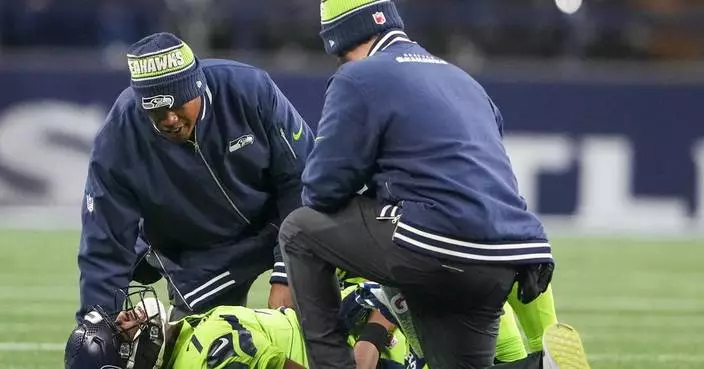WASHINGTON (AP) — A man who authorities say staked out Donald Trump for 12 hours on his golf course in Florida and wrote of his desire to kill him was indicted Tuesday on an attempted assassination charge.
Ryan Wesley Routh had been initially charged with two federal firearms offenses. The upgraded charges contained in a five-count indictment reflect the Justice Department's assessment that he methodically plotted to kill the Republican nominee, aiming a rifle through the shrubbery surrounding Trump's West Palm Beach golf course on an afternoon Trump was playing on it. Routh left behind a note in which he described his intention, prosecutors said.
Court records show the case has been assigned to Aileen Cannon, a Trump-appointed federal judge who generated intense scrutiny for her handling of a criminal case charging Trump with illegally hoarding classified documents at his Mar-a-Lago estate in Florida. She dismissed that case in July, a decision now being appealed by special counsel Jack Smith's team.
The attempted assassination indictment had been foreshadowed during a court hearing Monday in which prosecutors successfully argued for the 58-year-old Routh to remain behind bars as a flight risk and a threat to public safety.
They alleged that he had written of his plans to kill Trump in a handwritten note months before his Sept. 15 arrest in which he referred to his actions as a failed “assassination attempt on Donald Trump” and offered $150,000 for anyone who could “finish the job.” That note was in a box that Routh had apparently dropped off at the home of an unidentified witness months before his arrest.
After the attempted assassination, the person opened the box, took a photograph of the front page of the letter — addressed “Dear World” — and contacted law enforcement.
Prosecutors also said Routh kept in his car a handwritten list of venues at which Trump had appeared or was expected to be present in August, September and October.
The charge of attempted assassination of a major presidential candidate carries a potential life sentence in the event of a conviction. Other charges in the indictment include assaulting a federal officer, possessing a firearm in furtherance of a crime of violence and the two original firearms charges he faced last week.
The potential shooting was thwarted when a member of Trump’s Secret Service protective detail spotted a partially obscured man's face and a rifle barrel protruding through the golf course fence line, ahead of where Trump was playing. The agent fired in the direction of Routh, who sped away and was stopped by law enforcement in a neighboring county.
Routh did not fire any rounds and did not have Trump in his line of sight, officials have said. He left behind a digital camera, a backpack, a loaded SKS-style rifle with a scope and a plastic bag containing food.
The arrest came two months after Trump was shot and wounded in the ear in an assassination attempt during a campaign rally in Pennsylvania. The Secret Service has acknowledged failings leading up to that shooting but has said that security worked as it should have to thwart a potential attack in Florida.
The initial charges Routh faced in a criminal complaint accused him of illegally possessing his gun in spite of multiple felony convictions and with possessing a firearm with an obliterated serial number. It is common for prosecutors to bring preliminary and easily provable charges upon an arrest and then add more serious offenses later as the investigation develops.
The FBI had said at the outset that it was investigating the episode as an apparent assassination attempt, but the absence of an immediate charge to that effect opened the door for Florida's Republican Gov. Ron DeSantis to announce his own state-level investigation that he said could produce more serious charges.
Trump, seeking to cast doubt on the legitimacy of the investigation and the Justice Department more broadly, complained Monday — before the attempted assassination charge was brought — that federal prosecutors were “mishandling and downplaying” the case by bringing charges that were a “slap on the wrist.”
Asked Tuesday at an unrelated press conference about Trump’s criticism, Attorney General Merrick Garland said the Justice Department “would spare no resources to ensure accountability” in the case.
“All of our top priority should be ensuring that accountability occurs in this case and that those who run for office and their families are safe and protected,” Garland said.
The Justice Department also said Monday that authorities who searched Routh's car found six cellphones, including one that showed a Google search of how to travel from Palm Beach County to Mexico.
A notebook found in his car was filled with criticism of the Russian and Chinese governments and notes about how to join the war on behalf of Ukraine.
In addition, prosecutors have cited a book authored by Routh last year in which he lambasted Trump’s approach to foreign policy, including in Ukraine. In the book, he wrote that Iran was “free to assassinate Trump” for having left the nuclear deal.
Associated Press writers Alanna Durkin Richer and Curt Anderson contributed to this report.

Man who staked out Trump at Florida golf course charged with attempting an assassination

Man who staked out Trump at Florida golf course charged with attempting an assassination

Ryan Wesley Routh takes part in a rally in central Kyiv, Ukraine, Saturday, April 30, 2022. (AP Photo/Efrem Lukatsky)
SAN PEDRO SULA, Honduras (AP) — As dozens of deported migrants pack into a sweltering airport facility in San Pedro Sula, Norma sits under fluorescent lights clutching a foam cup of coffee and a small plate of eggs – all that was waiting for her in Honduras.
The 69-year-old Honduran mother had never imagined leaving her Central American country. But then came the anonymous death threats to her and her children and the armed men who showed up at her doorstep threatening to kill her, just like they had killed one of her relatives days earlier.
Norma, who requested anonymity out of concern for her safety, spent her life savings of $10,000 on a one-way trip north at the end of October with her daughter and granddaughter.
But after her asylum petitions to the U.S. were rejected, they were loaded onto a deportation flight. Now, she's back in Honduras within reach of the same gang, stuck in a cycle of violence and economic precarity that haunts deportees like her.
“They can find us in every corner of Honduras,” she said in the migrant processing facility. “We’re praying for God’s protection, because we don’t expect anything from the government.”
Now, as U.S. President-elect Donald Trump is set to take office in January with a promise of carrying out mass deportations, Honduras and other Central American countries people have fled for generations are bracing for a potential influx of vulnerable migrants — a situation they are ill-prepared to handle.
Honduras, Guatemala and El Salvador, which have the largest number of people living illegally in the U.S., after Mexico, could be among the first and most heavily impacted by mass deportations, said Jason Houser, former Immigration & Customs Enforcement chief of staff in the Biden administration.
Because countries like Venezuela refuse to accept deportation flights from the U.S., Houser suggests that the Trump administration may prioritize the deportation of “the most vulnerable” migrants from those countries who have removal orders but no criminal record, in an effort to rapidly increase deportation numbers.
“Hondurans, Guatemalans, Salvadorans need to be very, very nervous because (Trump officials) are going to press the bounds of the law,” said Houser.
Migrants and networks aiding deportees in those Northern Triangle countries worry their return could thrust them into even deeper economic and humanitarian crises, fueling migration down the line.
“We don’t have the capacity” to take so many people, said Antonio García, Honduras' deputy foreign minister. “There’s very little here for deportees." People who return, he said, "are the last to be taken care of.”
Since 2015, Honduras has received around half a million deportees. They climb down from planes and buses to be greeted with coffee, small plates of food and bags of toothpaste and deodorant. While some breathe a sigh of relief, free from harsh conditions in U.S. detention facilities, others cry, gripped with panic.
“We don’t know what we’ll do, what comes next,” said one woman in a cluster of deportees waiting for their names to be called by a man clacking at a keyboard.
Approximately 560,000 Hondurans, about 5% of the country's population, live in the U.S. without legal status, according to U.S. government figures. Of those, migration experts estimate about 150,000 can be tracked down and rapidly expelled.
While García said the government offers services to help returnees, most are released with little aid into a country gripped by gangs. They have few options for work to pay off crippling debts. Others like Norma have nowhere to go, unable to return home because of the gang members circling her home.
Norma said she’s unsure of why they were targeted, but she believes it was because the relative who was killed had problems with a gang.
Despite the crackdown, García estimates up to 40% of Honduran deportees make their way back to the U.S.
Larissa Martínez, 31, is among those who have struggled to reintegrate into Honduran society after being deported from the U.S. in 2021 with her three children. Driven by economic desperation and the absence of her husband, who had migrated and left her for another woman, the single mother sought a better life in the U.S.
Since her return to Honduras, Martínez has spent the past three years searching for a job, not just to support her kids, but also to pay off the $5,000 she owes to relatives for the trip north.
Her efforts have been unsuccessful. She built a wobbly wooden home tucked away in the hilly fringes of San Pedro Sula, where she sells meat and cheese to get by, but sales have been slim and tropical rains have eaten away at the flimsy walls where they sleep.
So she's begun to repeat a chant in her head: “If I don’t find work in December, I’ll leave in January.”
César Muñoz, a leader at Mennonite Social Action Commission, said Honduran authorities have abandoned deportees like Martínez, leaving organizations like his to step in. But with three deportation flights arriving weekly, aid networks are already stretched thin.
A significant uptick could leave aid networks, migrants and their families reeling. Meanwhile, countries like Honduras, heavily reliant on remittances from the U.S., could face severe economic consequences as this vital lifeline is cut.
“We’re at the brink of a new humanitarian crisis,” Muñoz said.
Trump’s return has been met with a range of reactions by Latin American nations connected to the U.S. through migration and trade.
Guatemala, a country with more than 750,000 citizens living unauthorized in the U.S. , announced in November it was working on a strategy to take on potential mass deportations. Mexican President Claudia Sheinbaum said Mexico is already beefing up legal services in its U.S. consulates and that she would ask Trump to deport non-Mexicans directly to their countries of origin.
Honduras’ Deputy Foreign Minister García expressed skepticism about Trump’s threat, citing the economic benefits immigrants provide to the U.S. economy and the logistical challenges of mass deportations. Aid leaders like Muñoz say Honduras isn’t sufficiently preparing for a potential surge in deportations.
Even with a crackdown by Trump it would be “impossible” to stop people from migrating, García said. Driven by poverty, violence and the hope for a better life, clusters of deportees climb aboard buses on their way back to the U.S.
As deportations by both U.S. and Mexican authorities spike, smugglers are offering migrants packages in which they get three tries to make it north. If migrants get captured on their journey and sent back home, they still have two chances to get to the U.S.
Freshly returned to Honduras, 26-year-old Kimberly Orellana said she spent three months detained in a Texas facility before being sent back to San Pedro Sula, where she waited in a bus station for her mother to pick her up.
Yet, she was already planning to return, saying she had no choice: her 4-year-old daughter Marcelle was waiting for her, cared for by a friend in North Carolina.
The two were separated by smugglers crossing the Rio Grande, in hopes to increase their chances of successfully crossing over. Orellana vowed to her daughter that they would be reunited.
“Mami, are you sure you’re coming?” Marcelle asks her over the phone.
“Now, being here it’s difficult to know if I’ll ever be able to follow through with that promise,” Orellana said, clinging to her Honduran passport. “I have to try again. … My daughter is all I have.”
Follow AP’s coverage of Latin America and the Caribbean at https://apnews.com/hub/latin-america

A worker offers personal care kits to Honduran migrants who were deported from the U.S. after they landed at Ramon Villeda Morales Airport in San Pedro Sula, Honduras, Wednesday, Dec. 4, 2024. (AP Photo/Moises Castillo)













